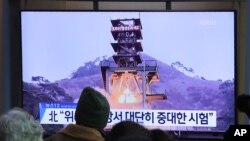ພວກຊາວເກົາຫຼືເໜືອທີ່ເສຍອົງຄະທັງຫຼາຍ ອາດປະເຊີນກັບການສ່ຽງ ຕໍ່ຄວາມບໍ່ສົມດຸນ ຍ້ອນຄວາມພະຍາຍາມເພື່ອທີ່ຈະຍົກລະດັບໂຄງການສ້າງອາວຸດທີ່ມີອານຸພາບຮ້າຍແຮງຂອງປະເທດນີ້.
ກຸ່ມອົງການຊ່ອຍເຫຼືອດ້ານມະນຸດສະທຳ ບາງສ່ວນ ທີ່ສະໜອງເຄື່ອງການແພດ ການສຶກສາ ແລະອຸປະກອນຊ່ອຍເຫຼືອພວກຄົນທີ່ມີຄວາມບົກຜ່ອງທາງຮ່າງກາຍ ຫູໜວກຫຼືຕາບອດ ແລະການບົກຜ່ອງໃນດ້ານການເຕີຍບໂຕອື່ນໆເປັນຕົ້ນ ກ່າວວ່າ ມາດຕະການລົງໂທດຂອງອົງການສະຫະປະຊາຊາດ ພ້ອມກັນກັບ ລັດຖະບານທ່ານທຣຳ ຊຶ່ງເປັນວິທີການ “ກົດດັນຢ່າງສຸດຂີດ” ທີ່ໄດ້ວາງຕໍ່ພຽງຢາງ ສຳລັບ ການທົດລອງນິວເລຄຍ ແລະລູກສອນໄຟຂີປະນາວຸດຂອງຕົນນັ້ນ ແມ່ນໄດ້ຈຳກັດຄວາມສາມາດຂອງອົງການທັງຫຼາຍ ທີ່ຈະດຳເນີນວຽກງານຕໍ່ໄປໄດ້ ຢູ່ໃນເກົາຫຼີເໜືອ.
ທ່າມກາງຂໍ້ຈຳກັດດັ່ງກ່າວເຫຼົ່ານັ້ນ ອົງການທີ່ບໍ່ຂຶ້ນກັບລັດຖະບານ ຫຼື NGO ຈຶ່ງໄດ້ຍົກເລີກໂຄງການຕ່າງໆຂອງພວກເຂົາເຈົ້າ ທັງໝົດໄປເລີຍ.
ແຫຼ່ງຂ່າວຫຼາຍແຫ່ງທີ່ກ່ຽວຂ້ອງກັບວຽກງານການຊ່ອຍເຫຼືອ ກ່າວຕໍ່ວີໂອເອ ວ່າ ອົງການ Humanity & Inclusion ຫຼື HI ໄດ້ຍຸຕິພາລະກິດຕ່າງໆຂອງຕົນຢູ່ໃນເກົາຫຼີເໜືອ. ອົງການຂອງຝຣັ່ງແລະແບລຈ້ຽມດັ່ງກ່າວ ທີ່ຍັງຮູ້ຈັກກັນຄື ອົງການຄົນພິການສາກົນ ຫຼື Handicap International ທີ່ໄດ້ທຳງານຢູ່ໃນປະເທດເກົາຫຼີເໜືອ ມານັບຕັ້ງແຕ່ປີ 2001 ແລະທຳງານໂດຍການສົມທົບກັບສະຫະພັນເພື່ອປົກປ້ອງຄົນພິການຂອງທາງການເກົາຫຼີເໜືອ ອີງຕາມເວັບໄຊຂອງອົງການທີ່ບໍ່ຫວັງຜົນກຳໄລ.
ອົງການ HI ໄດ້ປະຕິເສດ ທີ່ຈະໃຫ້ຄຳຕອບຢືນຢັນ ເຖິງການຍຸຕິກວຽກງງານດັ່ງກ່າວ ຕໍ່ການຂໍຮ້ອງ ຈາກວີໂອເອ.
ການຂາດຄວາມໂປ່ງໃສຂອງ ແລະການບໍ່ຄ່ອຍຢາກຈະປຶກສາຫາລື ກ່ຽວກັບວຽກງານຂອງພວກອົງການ NGO ຢ່າງເປີດເຜີຍຢູ່ນະທີ່ນັ້ນ ໄດ້ເຮັດໃຫ້ມີຄວາມຫຍຸ້ງຍາກສຳລັບພວກຜູ້ສັງເກດການຢູ່ພາຍນອກ ບໍ່ສາມາດວາດພາບໄດ້ຢ່າງຮ້ອບດ້ານຂອງສະຖານນະການທີ່ກຳລັງເກີດຂຶ້ນ.
ແຕ່ ທ່ານນາງນຳຊານິນ ຊາເດ-ຄຳມິງສ໌ ຜູ້ປະທະກະຖາ ໃນການສຶກສາດ້ານ ດ້ານມະນຸດສະທຳ ຢູ່ທີ່ມະຫາວິທະຍາໄລ ດີກກິນ ໃນນະຄອນແມລເບີຣນ໌ ຂອງອອສເຕຣເລຍ ກ່າວວ່າ “ຜົນກະທົບທີ່ສຳຄັນຍິ່ງຂອງມາດຕະການລົງໂທດ” ແມ່ນຮັບຜິດຊອບໂດຍກົງ ສຳລັບການຍົກຍ້າຍອອກມາຂອງອົງການສາກົນຕ່າງໆຈາກເກົາຫຼີເໜືອ ເຊັ່ນວ່າ ອົງການ HI.
ທ່ານນາງໄດ້ອະທິບາຍວ່າ ໃນຂະນະທີ່ ການເຄື່ອນໄຫວດ້ານມະນຸດສະທຳຢູ່ໃນເກົາຫຼີເໜືອ ແມ່ນຍັງໄດ້ຮັບອະນຸຍາດ ພາຍໃຕ້ມາດຕະການລົງໂທດຕ່າງໆຢູ່ ຂັ້ນຕອນການຍື່ນເອກກະສານເພື່ອຂໍການຍົກເວັ້ນຈາກບັນດາປະເທດສະມາຊິກທັງຫຼາຍແມ່ນໃຊ້ເວລາດົນນານ ແລະພ້ອມກັນນັ້ນ ການກີດກັນກ່ຽວກັບທຸລະກຳດ້ານການເງິນຂອງຄະນະກຳມະການວາງມາດຕະການລົງໂທດຂອງສະຫະປະຊາຊາດ ນຳໄປສູ່ການຫລຸດນ້ອຍຖອຍລົງຂອງຄູ່ຮ່ວມງານທັງຫຼາຍ ທີ່ອົງການເຫຼົ່ານັ້ນ ໄດ້ໃຊ້ເວລາຫຼາຍປີເພື່ອກໍ່ຕັ້ງຂຶ້ນກັບຟຽງຢາງ.
ອ່ານຂ່າວນີ້ຕື່ມ ເປັນພາສາອັງກິດ
North Koreans with disabilities may face disproportionate risk due to efforts to curtail the country's weapons of mass destruction programs.
Some humanitarian aid groups providing medical, educational and material support to people with physical, sensory and other developmental impairments say United Nations sanctions, as well as the Trump administration's "maximum pressure" campaign imposed on Pyongyang for its nuclear and ballistic missile tests, are limiting their ability to carry-out work in North Korea.
Amid those restrictions, some non-governmental organizations (NGOs) are abandoning their programs altogether.
Multiple sources involved in aid work tell VOA that Humanity & Inclusion (HI) is ceasing its North Korea operations. The French/Belgian organization, also known as Handicap International, has been active in the country since 2001 and works in conjunction with the state-run Korean Federation for the Protection of the Disabled, according to the non-profit's website.
HI declined to respond to VOA's request for confirmation.
North Korea's opacity and the reluctance of many NGOs to publicly discuss their work there make it difficult for outside observers to obtain a full picture of the situation.
But, Nazanin Zadeh-Cummings, who lectures in humanitarian studies at Deakin Univeristy in Melbourne, Australia, says the "detrimental impact of sanctions" is primarily responsible for the departure of international organizations, like HI, from North Korea.
She explains that while humanitarian activity in North Korea is permitted under the sanctions, the lengthy process of applying for exemptions from member states and the UN Sanctions Committee as well as blocks on financial transactions lead to the erosion of partnerships that these organizations have spent years building with Pyongyang.





